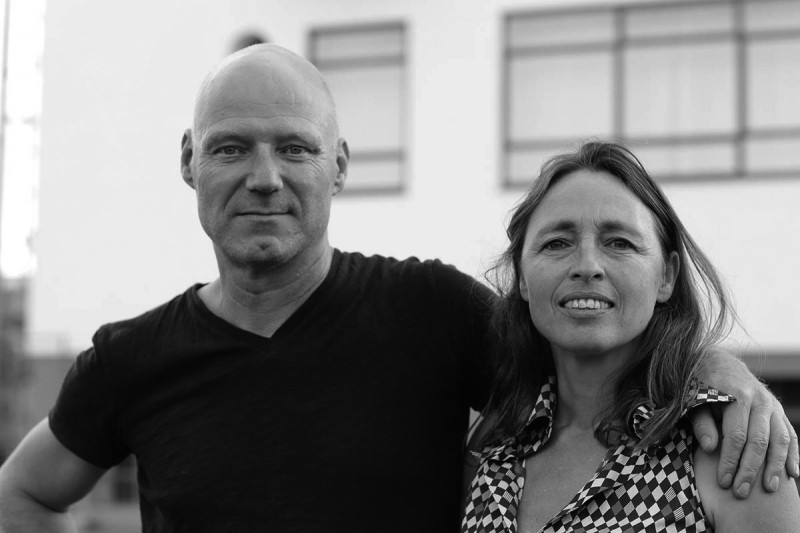

Can I touch you online? Can we measure intimacy? How does your kiss feel in EEG Data?
Art and science duo Karen Lancel and Hermen Maat (Lancel & Maat, Amsterdam) are considered pioneers exploring our sense of "togetherness" in our hybrid socio-technical world. Their multi-disciplinary work in Art, Science and Society has been internationally presented and awarded, and received national and European grants. The artists challenge new shared narratives about how technologies shape our perception of shared embodied experience, empathy and care, intimacy and isolation, identity and privacy, control and trust, in entanglement with (non-)human others. Since 2000 they create playful public Meeting spaces with new poetic scripts for 'Trust Rituals', innovative and critical 'Trust-Systems' and immersive multi-sensory 'Shared Reflexive Data-Scapes'. They carefully host the audience to meet in aesthetic 'Artistic Social Labs' - via the artists' radical re-designs of biometric and control technologies (incl. brain-computer and face-recognition interfaces, social haptics, wearable technologies, internet platforms, AI and robotics). In different cultures worldwide, their work provokes dialogue, imagination and storytelling about kinship in post-anthropocene sustainable ecologies.
The artists are engaged in Interactive Media Performance Art and Mixed Reality/Augmented/video/AI Installations; Education, Publications and (Key-)Lectures. Their Artistic Research resonates with Phenomenological and Posthuman Philosophy; Psychology; NeuroScience; Actor Network Theory; Complex, AI and Participatory Systems. Dr. Lancel's art-science PhD at the TU Delft (2023) (download) establishes among one of the world’s first interaction models for digital social touch and feeling touched.
AWARDS. ● EMAP European Media Art Platform (Europe Cultural Program) 2018-2021 ● NFF Golden Calf 2019 Netherlands Film Festival nomination 'Interactive' ● TASIE 2019 / Wu Guanzhong International Prize for Art, Science, Innovation by the Tsinghua University Beijing ● GAAC Global Art & AI Competition Award China 2019 ● 3d prize Europe Program Horizon 2020/ BrainHack - Waag Society Amsterdam - Science Gallery Dublin ● 2018: The Dutch Digital Art Canon for Media Art 1960-2000, by Li-MA Media Art Platform Amsterdam includes our work Agora Phobia (digitalis).
EXHIBITIONS click here: Venice Biennial 2015; Ars Electronica Festival Linz; ZKM Karlsruhe; Stedelijk Museum Amsterdam; Millenium Museum Beijing; ISEA Helsinki 2004/ Istanbul 2011/ Gwangzou 2019; Rijksmuseum Amsterdam; Urban Screens Melbourne; Nabi Art Center Seoul; De Appel Amsterdam; IMAL Brussel; OCT Shenzhen; Frascati Theatres Amsterdam; LABoral Gijón; WerkLeitz Halle; RIXC Riga, Eyebeam New York; National Museum of China; Sonic Acts Amsterdam; IASPIS Stockholm; Transmediale Berlin, Nieuwe Instituut Rotterdam; Li-Ma Amsterdam; Banff Center Canada (find more here).
PUBLIC COMMISSIONS. Rijksmuseum Amsterdam; Kunstgebouw Zuid-Holland, UP Projects London.
ART_SCIENCE RESEARCH. Lancel & Maat's multiple Partnerships have inspired new perspectives on the art and design of Ethics and Emotional Well-Being, including social (dis)connection and isolation (f.e. through (collective) trauma); co-creation; neurodiversity; and shared presence.
SHORT CV LIST
REPRESENTED by Public Art Lab Berlin (click here).
Papers & essays by Lancel/Maat (click here): published by Springer Verlag, InderScience, TEDx, CHI, ArtsIT, Leonardo, Francis & Taylor Publishers - International Journal of Performance Arts and Digital Media, MIT Press.
Publications about Lancel & Maat's work: (click here).
Work in Collections: ZKM Karlsruhe; Digital-Canon LIMA; KPN Telecommunication Netherlands; private collections.
(Keynote) Lectures (click here): TEDX Istanbul; World Expo 2010 Shanghai / Mobile Platforms; CHI Montreal, ISEA Gwangju South-Korea; EAI ArtsIT at Braga (P) and Aalborg; Brave New World - University Leiden; VR Days Rotterdam; Li-Ma Amsterdam; TransMediale Berlin; University for Applied Science Amsterdam .
Grants and Generous support (click here): Mondriaan Fund; Fund for Creative Industries; NWO Dutch Scientific Research Organisation, European Cultural Program; European EIC-ICT program; Embassies/Cultural Consulate of a.o.: Shanghai, New York, Canada, Moscow.
Artist-in-residencies and Fellowships (click here): EMAP European Media Art Platform; TASML Tsinghua University Beijing, Banff Media Center Canada; Iaspis Stockholm; University of Nottingham; EIT-ICT Europe; University of Applied Science Vienna; and Universities of Twente, University of Applied Science Amsterdam, Delft University of Technology.
Advisory Boards: Mondriaan Fonds, Amsterdam Fund for the Arts (AFK); City Council/Stadsdeel Amsterdam Zuid for Art in Public Space.
Teaching appointments (click here): BA and MA Art Minerva Academy and Hanze University Groningen where Dr. Lancel headed the MA Media Art department between 2005-2009; Tsinghua University Beijing, MA HKU Utrecht; Kookmin University Seoul; MA Art-Science KABK The Hague; MA Artez Enschede and Arnhem.
In Science, data represent things - in Art data point at themselves, for shared imagination.